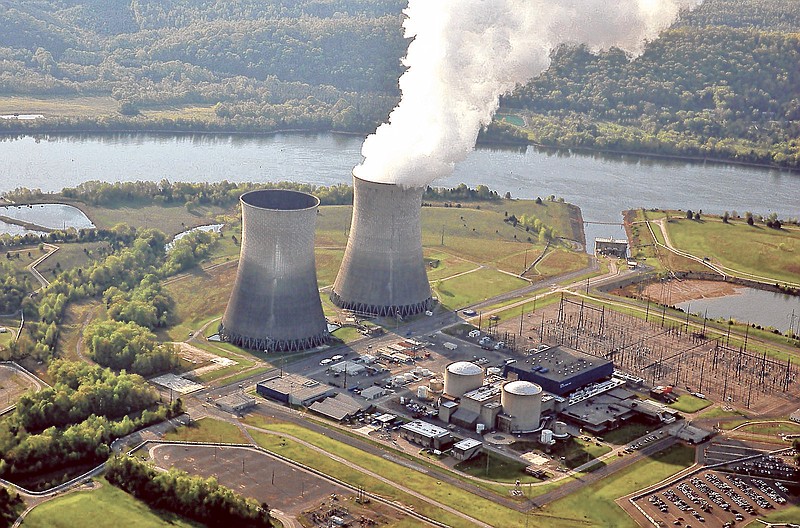A panel of outside nuclear experts who reviewed construction of TVA's newest nuclear reactor concluded that the plant is safely built and TVA is adequately addressing fire and flooding concerns raised by the Fukushima Dauiichi accident in Japan nearly four years ago.
But nuclear critics charge that the new reactor being built at Watts Bar may still end up being the most expensive reactor ever built with power costs nearly 25 percent higher than TVA's current generation.
The Advisory Committee on Reactor Safety said in its final assessment of the unit 2 reactor at the Watts Bar Nuclear Plant that TVA has adequately addressed all of its key questions about equipment, safety systems and operation.
"There is reasonable assurance that WBN 2 can operate as the second unit of the dual unit Watts Bar Nuclear Plant without undue risk to the health and safety of the public," the advisory board said in a letter to the Nuclear Regulatory Commission released Friday.
The committee spent six years meeting and reviewing work at the Watts Bar reactor since TVA decided to reactivate the long-stalled project. As an independent body within the NRC, the Advisory Committee on Reactor Safeguards made the recommendation to proceed with the licensing process after reviewing hundreds of detailed inspections and thousands of pages of documents from both TVA and the NRC.
The recommendation is part of the information NRC commissioners will consider when making a final decision on issuing an operating license for Watts Bar Unit 2, perhaps as soon as this spring. Barring unexpected problems, TVA will begin hot functional testing of plant equipment in March and could load nuclear fuel in the reactor by June in order to start power generation by December.
"While we have a significant amount of complex work remaining to complete Unit 2, we remain focused on delivering Unit 2 safely, with quality and in a manner to assure regulatory compliance and excellence in operations following licensing," Mike Skaggs, senior vice president of Watts Bar operations and construction, said in a statement Friday.
TVA officials Friday heralded the conclusions of the Advisory Committee on Reactor Safety as a major step forward toward gaining an operating license for the new plant.
"This completes a critical regulatory step in the process to start up the nation's first new nuclear unit in 20 years," TVA Chief Nuclear Officer Joe Grimes said. "This is a major milestone that will bring clean, reliable energy and economic benefits to TVA."
But nuclear power critics questions whether Watts Bar can ever deliver economical power to TVA.
Even if the Unit 2 reactor is started up later this year, the project is still 37 years behind its original schedule and three years behind the updated schedule TVA adopted in 2007 when directors thought the plant could be finished for $2.5 billion. The completion work is now projected to cost $4 billion to $4.5 billion and critics complain that TVA is keeping those costs below what they should be by prepaying for the plant work and forcing existing customers to pay for future power.
"The impact of treating consumers' money as if it has no time value, which is what advanced cost recovery does, can be seen in sharp focus in the case of Watts Bar," said Dr. Mark Cooper, senior fellow for economic analysis at the Institute for Energy and the Environment at the Vermont Law School. "TVA spent $2 billion before the project was abandoned over 30 years ago. The money came out of consumer's pockets, even though they got no electricity for it."
Cooper calculated that if consumers could have achieved even just a 1 percent real annual return on that money, they would have $5 billion more in their pockets.
"Combining the present value of $6 billion in those long ago sunk costs, to the additional $4 billion to $4.5 billion that will be spent to bring Watts Bar online makes it just about the most expensive reactor built in the United States, with an overnight cost in the neighborhood of $8,000 per kilowatt."
Such capital expenses, if amortized over the 30-year licensing life of the plant at TVA's average 5 percent cost of borrowing, would equal nearly 5.5 cents per kilowatthour, assuming the new reactor maintains a favorable 90 percent capacity factor.
Adding in the operating costs of nuclear fuel, staffing, security, tax-equivalent payments, insurance and waste disposal would likely boost the overall generating costs for Watts Bar Unit 2 to around 8 cents per kilowatthour of electricity produced by the reactor. That would be at least a fourth more than TVA's current average generating costs of about 6 cents per kwh.
Located near Spring City, Tenn., Watts Bar Unit 2 is approximately 95 percent complete and remains on target to begin commercial operations sometime between September 2015 and June 2016.
Contact Dave Flessner at dfless ner@timesfreepress.com or at 757-6340.
